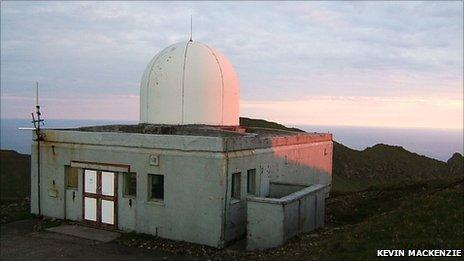St Kilda heritage management plan set out
- Published

The MoD runs a radar station on Hirta, the main island on St Kilda
A new management plan for the remote St Kilda archipelago is to be signed by a charity, public bodies and the Ministry of Defence (MoD).
National Trust for Scotland (NTS) said the document set out a vision for the islands for the next 20 to 30 years.
St Kilda, which lies 41 miles (66km) west of the Western Isles, is the UK's only natural and cultural Unesco World Heritage Site.
The MoD has a radar station on the main island of Hirta.
It tracks missiles fired on a range in the Western Isles.
Comhairle nan Eilean Siar, the local authority for the Western Isles, Historic Scotland and Scottish Natural Heritage will also sign up to the plan.
St Kilda does not have any permanent residents.
NTS staff and volunteers, MoD contractors and scientists can spend several months at a time on Hirta.
The largest island in the archipelago, Hirta was occupied until 1930 when the last islanders left after they asked to be evacuated because their way of life was no longer sustainable.
Last year, evidence of a permanent settlement was uncovered on another, smaller island.
Previously it was thought Boreray was only visited by islanders to hunt seabirds and gather wool from sheep.
St Kilda was bequeathed to NTS in 1957 and given World Heritage status in 1986.
In 2004, the designation was extended to include the surrounding marine environment and, in 2005, recognition was also given to St Kilda's unique cultural landscape.
NTS chief executive Kate Mavor said the new plan offered protection to the islands' wildlife and historical remains.
She said: "These beautiful and beguiling islands provide habitats for a range of important species, including one of the smallest mammals, the St Kilda Mouse.
"Protecting the seas around the archipelago is equally important for a rich variety of marine life, which by contrast includes the largest of mammals, such as killer whales and dolphins, as well as supporting colonies containing almost 5% of all the seabirds in Europe.
"Lichens and flowering plants, some unique, such as the recently discovered Pankhurt's dandelion, exist at the absolute limits of tolerance and support feral Soay sheep, living relics of domestic livestock from the Iron Age.
"It is for these reasons that St Kilda is not only treasured by Scotland but by the world and we have a supreme obligation to conserve and protect it for all."
Speaking for the MoD, Sean Quinn said the government department was re-affirming its commitment to work productively with NTS and others.
He added: "As well as helping to protect a World Heritage Site, this close co-operation will assist us in ensuring the ongoing delivery of vital test, evaluation and training services for the Armed Forces at the MoD Hebrides Range."
- Published29 June 2012
- Published9 February 2012
- Published26 August 2011
- Published17 June 2011
- Published29 August 2010